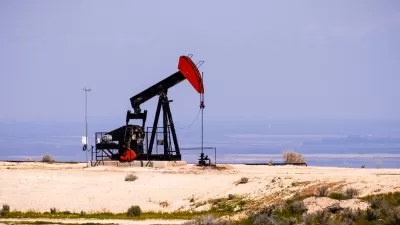The California governor, known for his outspoken climate advocacy, signed the nation's toughest fracking regulation bill in 2013. His response to those who want to ban fracking is that priority must be on reducing oil consumption.
"Fracking is a technique in which wells are injected with a chemical fluid under high pressure to fracture underground rock formations to release oil and natural gas that are otherwise unobtainable," reports John Wildermuth for the San Francisco Chronicle in an extensive piece on the controversial procedure, and also the importance of oil drilling to the Golden State, fourth in production after Texas, North Dakota, and Alaska.
While fracking has boosted energy production across the nation, environmentalists argue that the fluid used can threaten the water supply, that more [greenhouse gas] pollutants are released into the air and, more generally, that producing more oil allows people to use more oil.
“It’s hypocritical for Brown to call himself a climate leader,” said Catherine Garoupa White of Californians Against Fracking, a coalition of environmental groups. The governor’s support for fracking “is a huge smear on Brown’s green record.
Brown's response:
“California is only producing 30 percent of its oil,” Brown said. “The rest comes in ships, mostly, but increasingly in trains.”
Cutting the state’s oil production without cutting demand just means that more of California’s oil will come from other states or other countries, which may not have the strong restrictions on fracking and oil production that California now has.
Brown can point to his signing SB 4 in 2013, the "nation's toughest fracking bill," authored by renowned environmentalist Sen. Fran Pavley (D-Agoura Hills). And while Congress was debating rolling back an Obama-era regulation on methane emissions, the state Air Resources Board approved a landmark rule that regulates methane emissions from onshore and offshore oil and gas production and storage facilities.
Keep it in the ground
“Brown’s argument is that we can do oil drilling safer than importing oil, but that’s not a good climate argument,” said Dan Jacobson, legislative director for Environment California. “We need him to use his leadership and say that we’re going to leave some of that oil in the ground.”
Jacobson is not the first to espouse the "keep it in the ground," supply-oriented approach, but Brown views both supply and demand sides of oil consumption.
As we bring down consumption, we can bring down production,” the governor said, but since California residents now drive about 330 billion miles a year, most of it in vehicles powered by gasoline or diesel, there’s a long way to go.
Fracking proponents
“Fracking is a way to keep alive certain oil fields and access oil that’s now tightly locked,” said Nick Ortiz, president and CEO of the Greater Bakersfield Chamber of Commerce. “The governor is taking a common-sense stand that recognizes we already have strict standards and stringent regulations.”
Bakersfield, population 347,000 in 2010, is the county seat of Kern County, which "pumps more oil than Oklahoma, accounting for more than 70 percent of California’s production and more than 90 percent of its fracked wells," notes Wildermuth.
Fracking opponents have persisted, though, and as Wildermuth notes, the fight has gone on for years. Opponents have had more success in local political battles, such as a fracking ban in Monterey County that voters supported last November.
FULL STORY: Gov. Brown clashes with environmentalists over fracking

Alabama: Trump Terminates Settlements for Black Communities Harmed By Raw Sewage
Trump deemed the landmark civil rights agreement “illegal DEI and environmental justice policy.”

Study: Maui’s Plan to Convert Vacation Rentals to Long-Term Housing Could Cause Nearly $1 Billion Economic Loss
The plan would reduce visitor accommodation by 25% resulting in 1,900 jobs lost.

Planetizen Federal Action Tracker
A weekly monitor of how Trump’s orders and actions are impacting planners and planning in America.

Wind Energy on the Rise Despite Federal Policy Reversal
The Trump administration is revoking federal support for renewable energy, but demand for new projects continues unabated.

Passengers Flock to Caltrain After Electrification
The new electric trains are running faster and more reliably, leading to strong ridership growth on the Bay Area rail system.

Texas Churches Rally Behind ‘Yes in God’s Back Yard’ Legislation
Religious leaders want the state to reduce zoning regulations to streamline leasing church-owned land to housing developers.
Urban Design for Planners 1: Software Tools
This six-course series explores essential urban design concepts using open source software and equips planners with the tools they need to participate fully in the urban design process.
Planning for Universal Design
Learn the tools for implementing Universal Design in planning regulations.
Caltrans
Smith Gee Studio
Institute for Housing and Urban Development Studies (IHS)
City of Grandview
Harvard GSD Executive Education
Toledo-Lucas County Plan Commissions
Salt Lake City
NYU Wagner Graduate School of Public Service



























